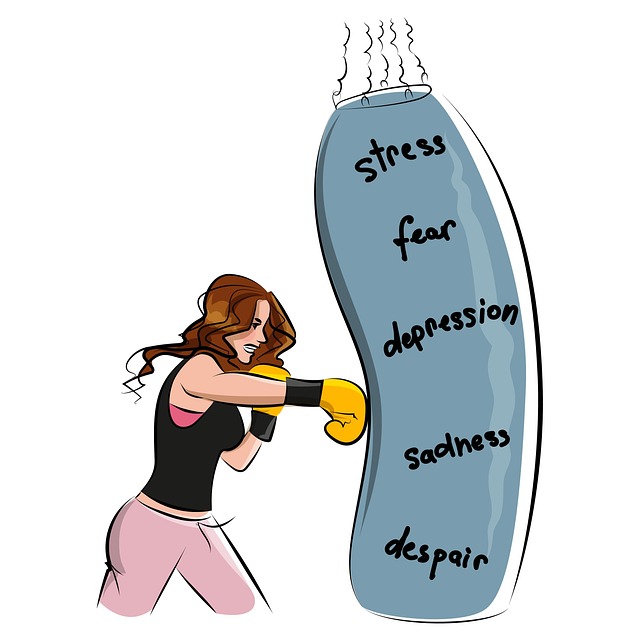Broomfield Anger Management Therapy offers a holistic approach to managing anxiety and anger, addressing root causes like stress reduction and depression prevention. They provide effective strategies including self-care routines, conflict resolution skills, mindfulness practices, and cognitive reframing to reduce burnout, enhance well-being, and empower individuals to face challenges with resilience. Through personalized techniques and open conversations about mental health, Broomfield Anger Management Therapy normalizes support-seeking behaviors and improves access to resources for stress relief and anxiety management in today's fast-paced world.
Anxiety is a common struggle, but managing it effectively can lead to a healthier, happier life. This comprehensive guide explores powerful strategies for tackling anxiety, with a focus on the innovative Broomfield Anger Management Therapy approach. We’ll delve into the profound impact of anxiety on daily life and uncover practical techniques to find calm amidst stress. Discover how Broomfield Anger Management Therapy offers a holistic solution, empowering individuals to overcome anxiety and reclaim their well-being.
- Understanding Anxiety and Its Impact
- Broomfield Anger Management Therapy: A Holistic Approach
- Practical Techniques for Daily Stress Relief
Understanding Anxiety and Its Impact

Anxiety is a natural response to stress and potential threats, but when it becomes overwhelming and persistent, it can significantly impact an individual’s daily life. Understanding anxiety involves recognizing its various forms, such as social anxiety, generalized anxiety disorder, or panic attacks, each with distinct symptoms. This mental health challenge often manifests physically, causing symptoms like increased heart rate, rapid breathing, and insomnia, which can lead to burnout if left unaddressed.
In Broomfield Anger Management Therapy, professionals focus on helping individuals manage and overcome anxiety by teaching effective coping strategies. By integrating self-care routine development for better mental health into daily life—including conflict resolution techniques and burnout prevention strategies for healthcare providers—one can significantly reduce anxiety’s impact. These techniques empower individuals to navigate challenging situations with resilience, fostering a sense of control and well-being.
Broomfield Anger Management Therapy: A Holistic Approach

Broomfield Anger Management Therapy takes a holistic approach to addressing and managing anger, recognizing that it’s often linked to deeper issues such as stress reduction methods and even depression prevention. Unlike traditional therapy models that might focus solely on the symptoms, this method delves into the root causes of anger, offering personalized strategies for long-term mental illness stigma reduction efforts. By exploring underlying triggers, individuals can gain a deeper understanding of their emotional responses, leading to more effective coping mechanisms.
Through various techniques, participants learn to transform negative anger into constructive energy, fostering better communication and healthier relationships. The program encourages mindfulness practices, cognitive reframing, and stress management tools tailored to individual needs. By embracing this holistic perspective, Broomfield Anger Management Therapy aims to empower individuals not just to control their anger but also to enhance overall well-being and resilience against mental health challenges.
Practical Techniques for Daily Stress Relief

In today’s fast-paced world, finding effective ways to manage daily stress is essential for maintaining good mental health. Broomfield Anger Management Therapy offers practical techniques that can help individuals navigate their day with a calmer mindset. One powerful strategy is incorporating self-care routines into one’s daily regimen. This could involve dedicated time for exercise, meditation, or engaging in hobbies. By allocating specific periods for relaxation and pleasure, individuals can mitigate the impact of stressors throughout the day.
Moreover, fostering mental resilience through mindfulness practices and cognitive behavioral techniques empowers people to confront challenges more effectively. Encouraging open conversations about mental health, as part of Mental Health Policy Analysis and Advocacy, helps reduce stigma, promoting a culture where seeking support is normalized. Increased Mental Health Awareness leads to better access to resources, ensuring individuals have the tools needed for stress relief and anxiety management.
In conclusion, managing anxiety effectively is a journey that combines understanding, holistic approaches, and practical techniques. The article has explored these aspects through discussions on the impact of anxiety, introducing Broomfield Anger Management Therapy as a comprehensive strategy, and sharing daily stress relief methods. By integrating these insights into their lives, individuals can better navigate and overcome anxiety, leading to improved well-being. Remember that, with dedication and the right tools, such as Broomfield Anger Management Therapy, managing anxiety is achievable and life-enhancing.











